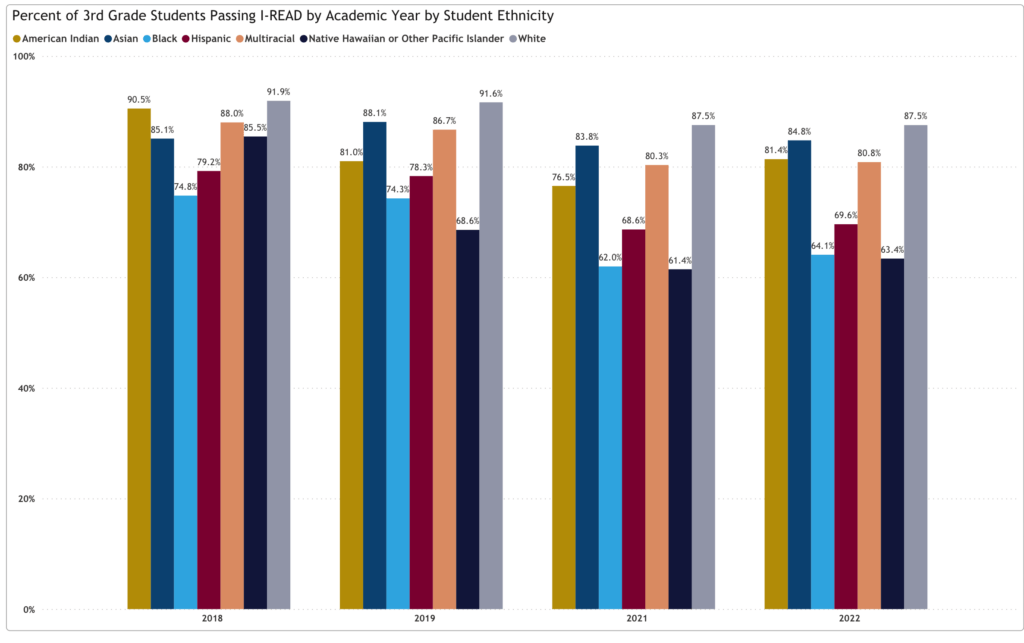Data Show Too Many Indiana Students Advancing to Fourth Grade Without Foundational Reading Skills
The Indiana Department of Education (IDOE) revealed alarming data indicating a significant literacy issue among Indiana’s students. According to the data, a considerable number of students are progressing to the fourth grade without mastering foundational reading skills. This concerning trend was the focal point of a new data visualization tool previewed to the State Board of Education (SBOE) and will soon be made available to the public.
Dr. Katie Jenner, Indiana Secretary of Education, emphasized the gravity of the situation: “First students learn to read, and then they read to learn. Today data show that one in five Indiana students have not mastered foundational reading skills by the end of third grade, and most of these same students are advancing to fourth grade unable to read.”
This data is not just a statistic; it reflects a deeper educational crisis. Students who lack these essential reading skills often struggle with future learning and face increased risks of not graduating. Dr. Jenner stressed the urgency of collaborative efforts among educators, parents, families, and policymakers to align resources and find effective solutions to ensure every child learns to read before leaving third grade.
The new data visualization tool is expected to play a crucial role in understanding current student literacy levels. It aims to support educators, parents, families, and community leaders in addressing this literacy challenge. Over time, this tool will help quantify the number of students at each grade level unable to read, track the long-term impacts of illiteracy, evaluate the effectiveness of current literacy efforts, and inform ongoing policy decisions.

Key findings presented to the SBOE include:
• A decade-long decline in Indiana’s literacy rates, predating the COVID-19 pandemic.
• Despite a decrease in third grade enrollment since 2012, the number of students failing to pass has more than doubled.
• A concerning trend of declining reading scores alongside decreased retention rates, resulting in thousands of students entering the fourth grade unable to read.
• Data indicating that over 96 percent of students who did not pass the IREAD-3 assessment were advanced to the fourth grade.
In 2023, out of approximately 14,000 students who failed IREAD-3, over 5,500 received a Good Cause Exemption (GCE), allowing them to bypass further testing requirements. However, of the 8,337 students who did not pass and did not receive a GCE, a staggering 95 percent were still advanced to the fourth grade.
The lack of future data for students who did not pass IREAD-3 makes it challenging to determine if they ever achieve literacy proficiency at the state level. However, other indicators suggest that most continue to struggle with text complexity, engagement in research components, and writing skills.
Students receiving GCEs have shown lower proficiency in subsequent ILEARN assessments. Those who do not pass IREAD-3 are at risk of not achieving proficiency in future assessments, including ILEARN, and are less likely to graduate.
A third-party study, ‘Holding Back to Move Forward: The Effects of Retention in the Third Grade on Student Outcomes’ (2022), highlights that from 2011-2012 and 2016-2017, third-grade retention in Indiana significantly and positively impacted student achievement in English/language arts (ELA) and math, with these effects persisting into middle school. Interestingly, being retained did not negatively affect student attendance or disciplinary incidents in later grades.
To combat this literacy crisis, Indiana has made historic investments in literacy, totaling over $170 million. These funds are being utilized in various ways to enhance student literacy:
• Schools can join the Indiana Literacy Cadre for free instructional coaching in the science of reading.
• Indiana Learns provides eligible parents with additional learning support and tutoring at no cost.
• The new Parent and Family Support Hub on the Indiana Learning Lab offers 24/7 access to resources for student learning support.
• Educators can complete IDOE’s science of reading modules, developed in partnership with Marian University, and earn a stipend.
• Early administration of IREAD-3 in Grade 2 provides an “On Track indicator” for parents and teachers.
• Targeted support is available for schools below 70% IREAD-3 passage through Literacy Support Plans.
• Incentives for teachers improving IREAD-3 scores are part of Indiana’s Literacy Achievement Grants.
Furthermore, current educators will soon have the opportunity to pursue a science of reading-focused literacy endorsement at no cost.
These efforts represent a comprehensive approach to address the literacy crisis in Indiana. As the state continues to navigate this challenge, the impact of these initiatives on student literacy rates will be closely monitored. The commitment to ensuring every child in Indiana has the necessary reading skills by the end of third grade remains a top priority for the IDOE and the broader educational community.
For additional information on literacy supports available to Indiana schools, visit the IDOE website.






